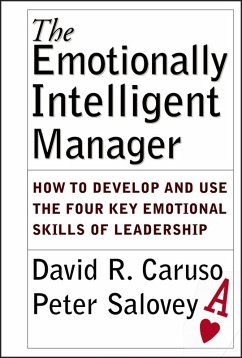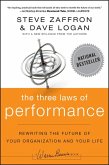Gefördert wird der Umgang mit den eigenen Emotionen, Wahrnehmungen und dem berühmten �Bauchgefühl� in BWL-Studiengängen und nicht gerade. Denn am Arbeitsplatz Gefühle zu zeigen gilt als unprofessionell. David R. Caruso und Peter Salovey steuern dagegen und helfen Lesern, ihre
emotionale Kompetenz zu steigern. Denn ihr Buch beruht auf der These, �dass Emotionen nicht nur…mehrGefördert wird der Umgang mit den eigenen Emotionen, Wahrnehmungen und dem berühmten �Bauchgefühl� in BWL-Studiengängen und nicht gerade. Denn am Arbeitsplatz Gefühle zu zeigen gilt als unprofessionell. David R. Caruso und Peter Salovey steuern dagegen und helfen Lesern, ihre emotionale Kompetenz zu steigern. Denn ihr Buch beruht auf der These, �dass Emotionen nicht nur wichtig, sondern sogar absolut notwendig sind, wenn wir gute Entscheidungen treffen, optimale Wege zur Problemlösung finden, mit Veränderungen umgehen und Erfolg haben wollen.� Wer jemals erlebt hat, wie die Stimmung in einem Team über seine Leistung entscheidet, der weiß genau, was gemeint ist. Mitarbeiter sind eben keine Maschinen, sondern Menschen und Gefühle beeinflussen ihr Verhalten sehr stark.
Um den Business-Lesern das leicht verdächtige Thema nahezubringen, verwenden die beiden Autoren eine betont nüchtern-sachliche Sprache, sie plädieren für Emotionen, indem sie den Verstand ansprechen. Manche Dinge in ihrem Buch sind für den Nicht-Gefühlskrüppel fast schon witzig, zum Beispiel die Illustrationen eines Gesichtes in unterschiedlichen Gefühlszuständen, wie sieht die Mimik aus, wenn jemand glücklich, traurig oder wütend ist? Die gängigen Smileys lassen grüßen. Doch ihre meisten Tipps und Erklärungen der beiden Psychologen sind wirklich nützlich. Zunächst geben sie dem Leser Raster und Analysemethoden an die Hand, um emotionale Situationen und Probleme zu analysieren. Doch sie erklären nicht nur, wie man Emotionen richtig bei anderen und sich selbst erkennt, sondern auch, wie man sie strategisch und geschickt nutzt (zum Beispiel durch das Phänomen �emotionalen Ansteckung� oder indem man die richtige Stimmung schafft).
Natürlich gibt es auch ausführliche Selbsttests, in denen man feststellen kann, ob man Gefühle richtig interpretieren kann und ob man schon emotional intelligent ist. Hier sind die Autoren auf vertrautem Terrain, schließlich haben sie den �Mayer-Salovey-Caruso Emotional Intelligence Test� aus der Taufe gehoben. Kleiner Trost: die Lektüre des Buches ist nicht überflüssig, denn der EQ ist, so die Autoren, nicht ausschließlich angeboten, sondern ausbaufähig. Wer dieses Projekt anpacken will und das Ziel hat, effektive zwischenmenschliche Beziehungen aufzubauen, der ist mit diesem Buch wirklich gut bedient. Deshalb 3 Sterne.
Kurzbeschreibung
Die meist unterschätzte Management-Kompetenz
Gefühle sind fester Bestandteil unseres Denkens und Handelns - auch im Berufsleben und in Unternehmen!
Die Begründer der Theorie der Emotionalen Intelligenz (EI) zeigen, wie Manager Emotionen in den Führungsalltag einbeziehen und gezielt nutzen können. Ein Manager, der fachlich kompetent ist, aber seine Gefühle nicht im Griff hat, wird nie erfolgreich sein. Ein Vorgesetzter, der die Emotionen seiner Mitarbeiter nicht versteht, wird Krisensituationen nicht meistern können. Anhand vieler Beispiele zeigen die Autoren, wie Manager ihre emotionale Kompetenz trainieren können, um die eigenen Gefühle und die ihrer Mitarbeiter zu erkennen, zu nutzen und zu steuern. Das ultimative Praxisbuch für ein produktives Emotionsmanagement im Führungsalltag. Mit den Fallbeispielen Joschka Fischer und Heinrich von Pierer.









